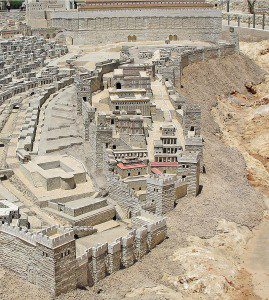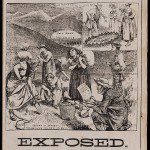
Wikimedia CC; click to enlarge
Today, I offer the second installment of my project to read the Book of Mormon through in company with others here. We now begin with the text of the Book of Mormon proper, with 1 Nephi 1. (Yesterday, we looked briefly at the Title Page of the Book of Mormon.)
I choose to focus on just one aspect of the very first verse, 1 Nephi 1:1:
I’ve long thought about the adjective goodly, used to describe Nephi’s “goodly parents.” I had grown up with the notion, as pretty much everybody did, that goodly was simply an archaizing synonym for good. Nephi received an excellent education because he had kind, generous, and caring parents.
That’s an especially nice point to raise when teaching the Book of Mormon to kids. And to parents.
But then somebody suggested that goodly is an obsolete equivalent of English wealthy or rich. Nephi’s parents were well-to-do. They had goods. Thus, they were able to provide their son with a first-rate education.
I like this suggestion. It fits. It sheds light on Nephi’s background and on his family.
But my friend Kevin Barney now suggests, alas, that there is no basis in English historical lexicography for it.
That’s disappointing.
However, I still have some faint hope for the notion:
Kevin looks at Webster’s 1828 American dictionary and, very carefully, at occurrences of goodly in the King James Version of the Bible. But Royal Skousen and Stanford Carmack are encouraging readers of the Book of Mormon to consider the English grammar, syntax, and vocabulary of roughly 1400-1600 — i.e., from as much as two centuries prior to the appearance of the “Authorized” translation — as we study the book. Did goodly have a different sense then?
I’m not in a very good position, at the moment, to look. But I’m curious.
There so very much more that could be said about 1 Nephi 1, and even about 1 Nephi 1:1, than I’ve said here. But my rule for this project is to simply comment, briefly, on one aspect of any given chapter. And perhaps not on the most important aspect, or the most important verse. To attempt exhaustiveness would be to render the project intimidating, and, thus, impossible. I simply don’t have the time.
But, as I explained yesterday, anybody can comment on anything he or she desires, whether systematically or sporadically, as much or as little as he or she chooses. And I expect to do this project over again, eventually, after this reading cycle is finished.
Please feel free to contribute. Questions, quotations, illustrative anecdotes, suggestions for practical application, links for further reading (including, authors, things that you yourself might have written), cross references, historical background, archaeological materials — whatever.
And feel free, too, to comment on previous passages. Comments on earlier chapters don’t end simply because we’ve taken up a new chapter or two in the interim.
Posted from Richmond, Virginia











